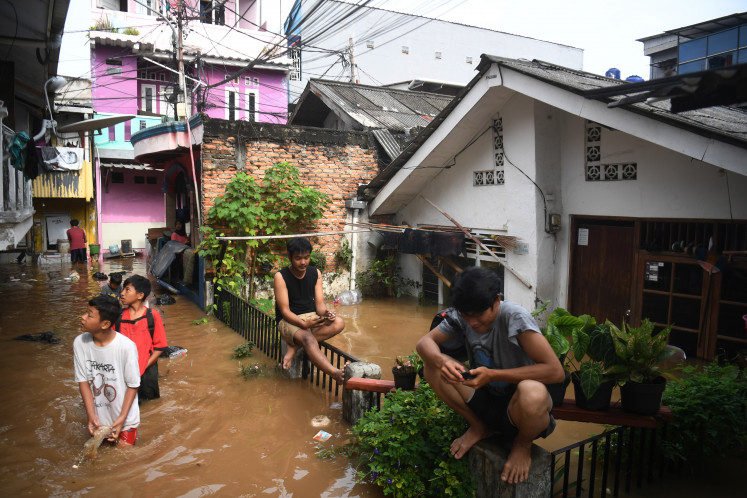Popular Reads
Top Results
Can't find what you're looking for?
View all search resultsPopular Reads
Top Results
Can't find what you're looking for?
View all search resultsNurifah Rasidi: Speaking up for domestic workers abroad
JP/Agnes WinartiOutspoken Nurifah Rasidi considers herself one of the lucky foreign domestic workers in Singapore
Change text size
Gift Premium Articles
to Anyone

J
span class="caption" style="width: 398px;">JP/Agnes WinartiOutspoken Nurifah Rasidi considers herself one of the lucky foreign domestic workers in Singapore.
In the 12 years she has worked there, she has never had to endure the ugly abuse some of her peers have been subjected to.
But Nurifah also realizes that her less fortunate Indonesian peers need channels to relieve their frustration.
It was back in 2003, when she was having breakfast with her Chinese family employer, that she came to that realization.
She noticed a timid-looking Indonesian domestic worker sitting on her own in a corner of the coffee shop, while her employers dined on the other side of the room.
“My Ma’am asked me: Look at that Nurifah, why is the maid so estranged? What do you think Nur, can you help her?” recalled the Medan, North Sumatra-born 43-year-old Nurifah, who initiated the informal helpline community Indonesia Family Network (IFN) in 2003.
“On my way home that day, I kept thinking about my Ma’am’s question. To whom can that child talk to about her problems?” the mother of three Nurifah told The Jakarta Post, recently.
Not long after that, Nurifah, along with several other domestic workers, started distributing flyers at traditional wet markets in Singapore.
“I bought blocks of paper, made copies of the flyers [at her employer’s office], which had our personal mobile numbers, and invited all troubled Indonesian maids to call or SMS us.”
Issues domestic workers face include physical abuse, withholding of salary, food deprivation and overwork.
“Last year alone, about 60 domestic workers called IFN with pressing issues,” said Nurifah, whose
community counts 150 members.
“We also pick up maids who have decided to run away from their employers,” said Nurifah, who dropped out of her accounting degree at a university in Medan, North Sumatra, before coming to Singapore in 1999.
She recalled receiving a call at 3 a.m. from a desperate domestic helper who had ran away. Her employer was holding her captive and hadn’t paid her for three years. The maid was at a bus stop in the Hougang area, a suburb in the northeastern area of Singapore and did not know where to go.
“I walked out [tiptoeing] of my employer’s home and picked her up at that bus stop,” said Nurifah, as stated on the website www.youtube.com/user/smuinfinity, created by students from the Singapore Management University (SMU).
After finding a hotel for the runaway maid, Nurifah returned to her employer’s home. The next morning, she took her to a local NGO specializing in migrant workers, Humanitarian Organization for Migration Economics (HOME), to find a refuge.
“Two weeks later, she called me from the airport in Jakarta. She thanked me. And I felt really happy,” said Nurifah.
IFN has been assisting runaway domestic workers get further help from the Indonesian Embassy or HOME.
The officer looking after the domestic workers protection affairs portfolio at the Indonesian Embassy (KBRI) in Singapore, Fahmi Aris Innayah, said the KBRI shelter could house up to 135 people a day. Last year, 2,526 domestic workers who had runaway from their employers sought help from the KBRI.
Most were newcomers to Singapore, who earned S$350 or less and worked seven days a week. Almost all were paying off loans too, therefore only pocketing $10 to $20 of their salary in their first nine months.
According to the latest figure from the Indonesian Embassy, Indonesian domestic workers represent 92,000 of the 167,000 Indonesians staying in Singapore. Indonesian domestic workers make up the majority of the 196,000 domestic workers in Singapore. The other 71,000 domestic helpers come from the Philippines, Malaysia, Thailand, Myanmar, Bangladesh, India, Pakistan and Sri Lanka.
Nurifah’s initiatives have gained the support of HOME, other NGOs like the Samaritan of Singapore, a non-profit and non-religious organization that provides 24-hour confidential emotional support to people in need, the society for migrant workers welfare or TWC2, which stands for Transient Workers Count Too and the Singapore’s Ministry of Manpower (MOM).
Nurifah, who in 2005 also volunteered as a counselor for the HOME’s helpline desk, has received counselor training from HOME, TWC2 and the Samaritan of Singapore.
While working as a domestic helper, Nurifah, said she still found time to volunteer thanks to the support of kind employers.
She added that didn’t let herself dependent on any recruitment agent.
“Thus, when I’m looking for a new employer, I usually apply to them directly.”
She also believes domestic helpers should feel like they can pick employers that suit them too.
The IFN community funds its activities through donations from members ($2 a month) and from charities.
“The TWC2 provides us with an office to hold our meetings, while HOME always involves us in their activities,” said Nurifah.
Aside of from phone counseling, Nurifah explained IFN also offered its members community activities, allowing Indonesian maids to explore their interest and talents in the arts and culture, so they could further their knowledge and improve their self-confidence.
The IFN organizes visits to the homes of the disabled and elderly, art, traditional dance and drama performances, photography and painting lessons.
“The most important thing is when we have a day off, we must be able to spend it doing something useful for our personal growth,” she said.
Days off are still a rarity for some domestic workers. They aren’t compulsory for Indonesian maids working in Singapore.
“Experience is priceless. It is the best teacher. Through this range of activities, we also show workers that everyone is talented, domestic workers included,” said Nurifah.









